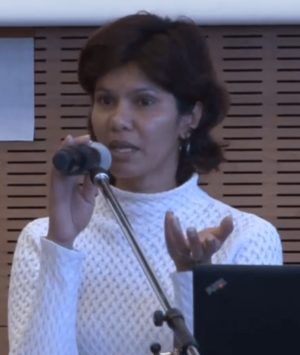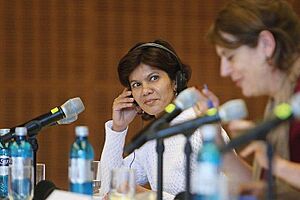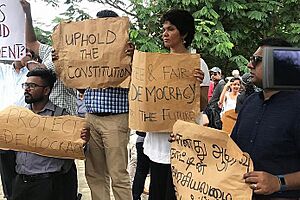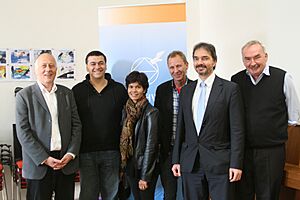Shreen Abdul Saroor facts for kids
Quick facts for kids
Shreen Abdul Saroor
|
|
|---|---|

Shreen Abdul Saroor in 2014.
|
|
| Born | 1969 (age 56–57) Mannar, Northern Province, Ceylon
|
| Education | University of Colombo (BBA) |
| Occupation | Activist, Writer |
| Organization | Mannar Women's Development Federation (MWDF) Women's Action Network (WAN) |
| Known for | Women's rights advocacy |
Shreen Abdul Saroor (born 1969) is a peace and women's rights activist from Sri Lanka. She is known for helping women who were affected by the Sri Lankan civil war.
Saroor started an organization called the Mannar Women's Development Federation (MWDF). This group helps women rebuild their lives. She also helped create the Women's Action Network (WAN). This network brings together women from all over Sri Lanka to work for positive change.
Saroor grew up during the civil war and saw its effects on families and communities. In 1990, her own family was forced to leave their home. They had to live in a camp for people who had lost their homes, known as internally displaced persons. This experience inspired her to become an activist and help others, especially women.
Her work includes helping women start small businesses, fighting for fair laws, and bringing together people from different backgrounds to live in peace. She has been honored with many international awards for her efforts.
Contents
Early Life and the Civil War
Shreen Saroor was born in 1969 in Mannar, Sri Lanka. Her family was Muslim and spoke the Tamil language. She grew up in a neighborhood where Hindus, Muslims, and Christians lived together peacefully.
Her father was a teacher who encouraged her to be active. He taught her to climb trees and play sports, which was unusual for girls in her community at the time. For her education, she was sent to a Catholic school.
When the Sri Lankan civil war began, life in Mannar changed. The Liberation Tigers of Tamil Eelam (LTTE), a rebel group, would try to recruit children to become soldiers. Two of Saroor's classmates left school to join them.
As the war continued, fighting between the LTTE and the Sri Lankan army became common. Sometimes, Saroor and her family had to hide in a bunker to stay safe. The war also created tension between the Tamil and Muslim communities. Saroor was saddened when a family friend was killed by the LTTE because he had connections to the Muslim community.
In 1987, a peacekeeping force from India came to Sri Lanka. At first, people hoped they would bring peace. But the fighting got worse. Saroor saw many sad and violent things on her way to school. She became disappointed with the violence and decided that fighting was not the answer.
Education and Leaving Home
Despite the conflict, Saroor did well in school. A teacher convinced her father to let her go to a university. In 1989, she moved to the south of Sri Lanka to study at the University of Colombo.
Life in the south was difficult. She did not speak the main language, Sinhala, and was sometimes treated poorly because she was from the north.
In 1990, her studies were stopped when the LTTE forced all Muslims to leave the Northern Province. This included her family in Mannar. Saroor's family had to escape on small fishing boats. Her father, who was in the city of Colombo at the time, tried to get help from the government, but they refused.
Saroor and her father traveled to a town called Puttalam to find the rest of their family. They found them in a camp for people who had been forced from their homes. Saroor's father then got a job as a school principal, which helped the family avoid living in the camp. He also started an organization to help the other people in the camps. Saroor volunteered with him and learned how to be a community leader.
Sadly, her father died of a heart attack soon after. As the oldest child, Saroor had to work to support her family. After graduating from university in 1994, she worked for a large company but continued to volunteer to help those in the camps.
A Life of Activism
Starting the MWDF
In 1998, eight years after leaving Mannar, Saroor returned for a visit. She saw that many women were now the heads of their families because of the war. These women struggled to earn money to support their children.
This visit inspired Saroor and a friend to start an organization to help these women. At first, some community leaders were not interested in a group just for women. But Saroor and her friend did not give up. They got support from teachers at her old school and created the Mannar Women’s Development Federation (MWDF) in October 1998.
The MWDF's mission was to help women heads of households through small loans, called microcredit, to start businesses. The group also worked to promote peace between the Tamil and Muslim communities. The first loan of $50 went to a woman who had been injured by a landmine. Within six months, the MWDF had 6,000 members.
The MWDF also helped women in other ways. It taught them job skills and helped them with family planning. The group also worked to stop violence in homes by talking to abusers and supporting women who were hurt.
Bringing People Together
In 2000, Saroor started a program to help young people from different backgrounds understand each other. She brought together Tamil and Muslim students to share their stories. Later, she arranged for them to meet and stay with Sinhalese youths in the south. These meetings helped build friendships and break down fear between the groups.
In 2001, after two Tamil women were harmed by navy officers, the MWDF organized a protest. About 7,000 women from different religions joined the march. This protest drew attention from international human rights groups. Because of the pressure, the government investigated the case, which became an important moment for women's rights in Sri Lanka.
Women's Action Network (WAN)

After the civil war ended, Saroor wanted to do more to help women across the country. In 2010, she brought together nine women's groups to form the Woman's Action Network (WAN).
WAN helps women who have faced violence and works to change unfair laws. One of its main goals is to reform the Muslim Marriage and Divorce Act. This law allows for child marriage and makes it hard for women to get a divorce. WAN wants to make sure the law respects the rights of all women.
Saroor has also spoken out against hatred and violence targeting Muslims in Sri Lanka. She has also worked to protect the rights of Sri Lankan migrant workers, many of whom are women working in difficult conditions in other countries.
Awards and Recognition
Shreen Saroor's work has been recognized around the world. Here are some of her awards:
- Woman PeaceMaker Award (2004) from the Joan B. Kroc Institute for Peace and Justice.
- Voices of Courage Award (2008) from the Women's Refugee Commission.
- N-Peace Award (2011) from the United Nations for her work in promoting peace.
- Bremen Peace Award (2011) for her public work.
- Franco-German Prize for Human Rights and the Rule of Law (2017).



